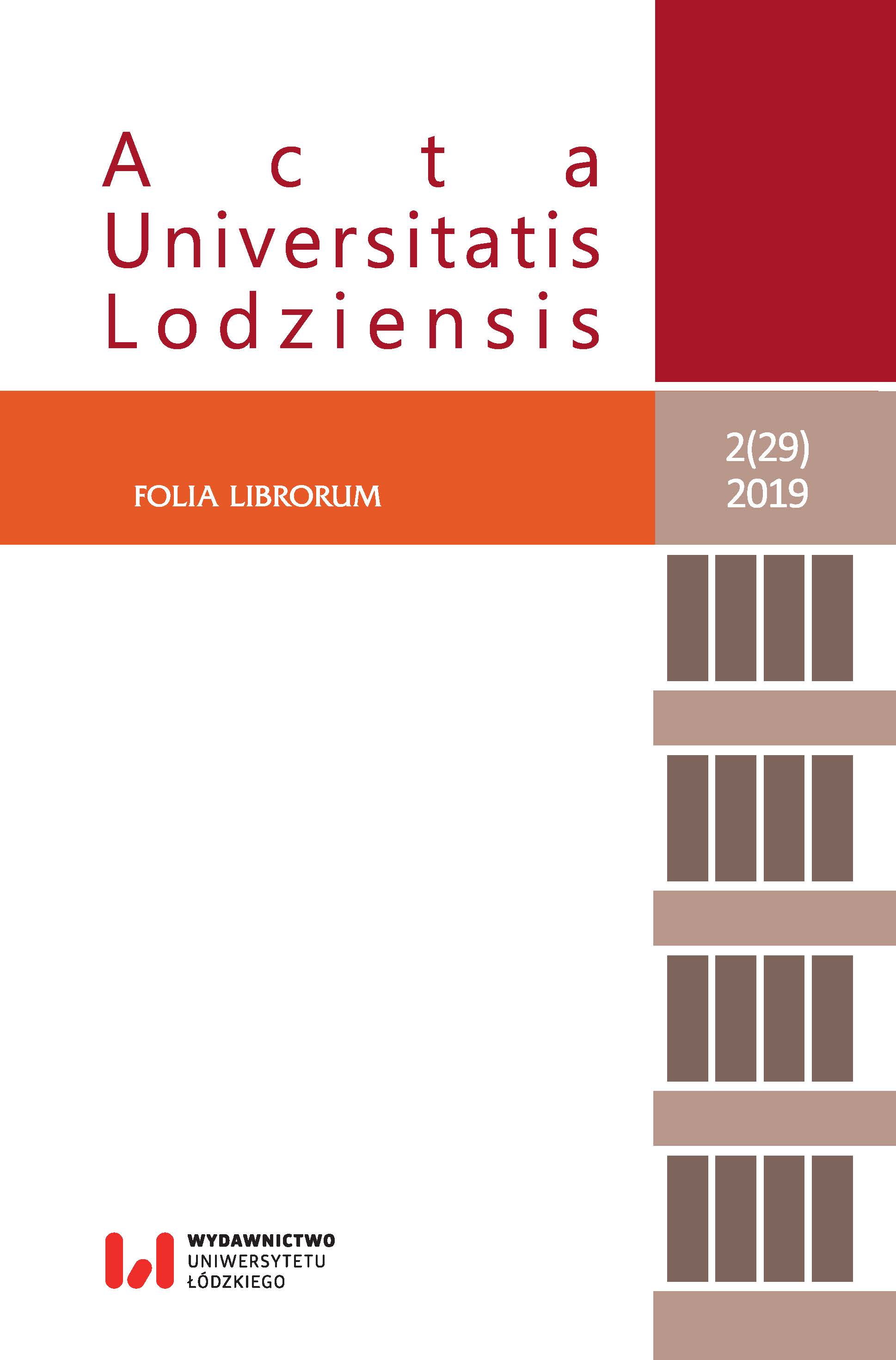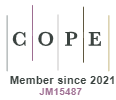Czy (centralne) katalogi biblioteczne są jeszcze potrzebne? OPAC w infotopii
DOI:
https://doi.org/10.18778/0860-7435.29.03Słowa kluczowe:
współdziałanie metadanych, katalogi centralne, OPAC, big data, Linked Open DataAbstrakt
W artykule przedstawiono podstawową funkcję katalogów centralnych: zapewnienie współdziałania (ang. interoperability) metadanych bibliotecznych. Zdefiniowano problem współdziałania metadanych jako element współdziałania systemów informacyjnych, szczególnie funkcjonujących w sieci. Przedstawiono sposoby stosowane dla zapewnienia współdziałania. Opisano trzy technologie, które w przyszłości powinny ułatwić osiągnięcie współdziałania metadanych: bazy danych NoSQL, aplikacje chmurowe oraz Linked Open Data.
Pobrania
Bibliografia
Bermes, Emmanuelle (2011). Convergence and interoperability: a Linked Data perspective. In: World Library and Information Congress: 77th IFLA General Conference and Assembly. Puerto Rico, 13–18 August 2011. Pobrane 28 maja 2019, z: https://www.ifla.org/past-wlic/2011/149-bermes-en.pdf
Google Scholar
Breeding, Marshall (2012). Current and future trends in information technologies for information units. El profesional de la información, 21, 9–15.
Google Scholar
DOI: https://doi.org/10.3145/epi.2012.ene.02
Carney, David J. & Smith, James & Place, Patrick R. (2005). Topics in interoperability: infrastructure replacement in a system of systems. Report nr CMU/SEI2005-TN-031. Pitsburgh: Carnegie Mellon Univ.
Google Scholar
Chan, Lois M. & Zeng, Marcia L. (2006). Metadata interoperability and standardization – a study of methodology part I. Achieving interoperability at the schema level.
Google Scholar
DOI: https://doi.org/10.1045/june2006-chan
D-Lib Magazine, 12 (6). Pobrane 25 maja 2019, z: http://www.dlib.org/dlib/june06/chan/06chan.html
Google Scholar
Coyle, Karen (2017). Creating the catalog, before and after FRBR. Pobrane 15 czerwca 2019, z: http://kcolyle.net/mexico.html
Google Scholar
Dunsire, Gordon i in. (2012). Linked Data vocabulary management: infrastructure support, data integration, and interoperability. Information Standards Quarterly, 24, 4–13.
Google Scholar
DOI: https://doi.org/10.3789/isqv24n2-3.2012.02
Heath, Tom & Bizer, Christian (2011). Linked Data. Evolving the Web into a Global Data Space. San Rafael, CA: Morgan & Claypool Publ.
Google Scholar
IFLA (2005). Sharing of bibliographic information and resources. Pobrane 12 czerwca 2019, z: http://archive.ifla.org/VII/d4/pub/InteroperabilityStandards.pdf
Google Scholar
Katal, Avita & Wazid, Mohammad & Goudar, Rayan H. (2013). Big data: issues, challenges and good practices. In: M. Parashar (ed.), Sixth International Conference on Contemporary Computing (IC3), Noida, India 8–10 Aug. 2013 (p. 404–409). Piscataway, NJ: IEEE.
Google Scholar
Kienzler, Iwona (2003). Słownik terminologii komputerowej angielsko-polski i polsko-angielski. Gdynia: IVAX.
Google Scholar
Krajewski, Markus (2017). Tell data from meta: tracing the origins of big data, bibliometrics, and the OPAC. OSIRIS, 32 (1), 224–240.
Google Scholar
DOI: https://doi.org/10.1086/694228
Manso-Callejo, Miguel & Wachowicz, Monica & Bernabé-Poveda, Miguel-Angel (2009). Automatic metadata creation for supporting interoperability levels of spatial data infrastructure. Pobrane 12 maja 2019, z: http://www.gsdi.org/gsdiconf/gsdi11/papers/pdf/194.pdf
Google Scholar
Mitchell, Erik (2013). Programmatic tools and the implications of automation in the next generation of metadata. Technical Services Quarterly, 30, 296–310.
Google Scholar
DOI: https://doi.org/10.1080/07317131.2013.785802
Nahotko, Marek (2013). Współdziałanie metadanych w systemach informacyjnych. Zagadnienia Informacji Naukowej, 1, 61–83.
Google Scholar
Nahotko, Marek (2014). Współdziałanie metadanych w chmurze. Przegląd Biblioteczny, 1, 3–24.
Google Scholar
Nilsson, Mikael (2010). From interoperability to harmonization in metadata standardization. Stockholm: KTH School of Computer Science and Communication.
Google Scholar
NISO (2004). Understanding metadata. Bethesda: NISO Press.
Google Scholar
Pacek, Jarosław (2010). Bibliografia w zmieniającym się środowisku informacyjnym. Warszawa: Wydawnictwo SBP.
Google Scholar
Radwański, Aleksander (2015). System biblioteczny jako powszechna usługa sieciowa i baza danych. W: M. Odlaniecka-Poczobutt (red.), Systemy biblioteczne nowej generacji. Platformy usług (s. 31–38). Gliwice: TYPO Usługi Wydawnicze.
Google Scholar
Sandy, Heather M. (2019). Explaining cataloging to a six year old? Technical Services Quarterly, 36, 379–390.
Google Scholar
DOI: https://doi.org/10.1080/07317131.2019.1664092
Su, Shiao-Feng (1994). Dialogue with an OPAC: how visionary was Swanson in 1964? The Library Quarterly, 64, 130–161.
Google Scholar
DOI: https://doi.org/10.1086/602674
Subieta, Kazimierz (1999). Słownik terminów z zakresu obiektowości. Warszawa: Akademicka Oficyna Wydawnicza PLJ.
Google Scholar
Taylor, Arlene & Joudrey, Daniel (2008). The Organization of information. Westport: Libraries Unlimited.
Google Scholar
Tennant, Roy (2002). MARC must die. Library Journal, October 15, 26–28.
Google Scholar
Wilson, Kristen (2012). Introducing the next generation of library management systems. Serials Review, 38, 110–123.
Google Scholar
DOI: https://doi.org/10.1080/00987913.2012.10765438
Zeng, Marcia L. & Chan, Lois M. (2006). Metadata interoperability and standardization – a study of methodology part II. Achieving interoperability at the record and repository levels. D-Lib Magazine, 12. Pobrane 5 czerwca 2019, z: http://www.dlib.org/dlib/june06/zeng/06zeng.html
Google Scholar
DOI: https://doi.org/10.1045/june2006-zeng
Zeng, Marcia L. & Qin, Jian (2008). Metadata. New York: Neal-Schuman Publ.
Google Scholar
Pobrania
Opublikowane
Jak cytować
Numer
Dział
Licencja

Utwór dostępny jest na licencji Creative Commons Uznanie autorstwa – Użycie niekomercyjne – Bez utworów zależnych 4.0 Międzynarodowe.










